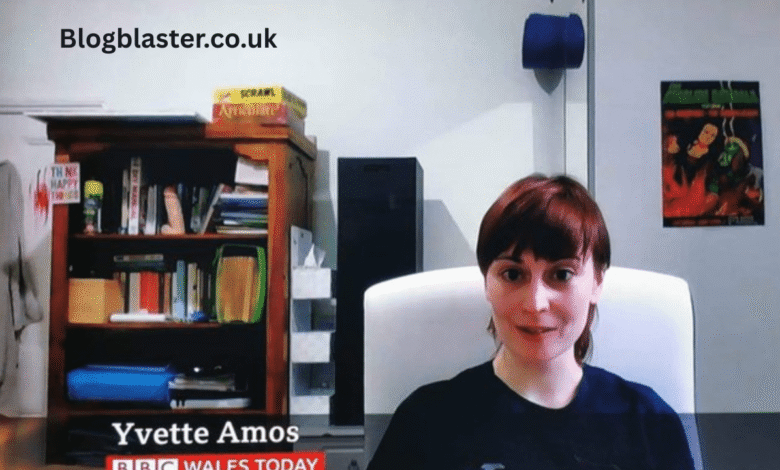Yvette Amos: The Unexpected BBC Star Who Went Viral Overnight

Introduction: Who Is Yvette Amos?
In early 2021, a woman named Yvette Amos unexpectedly became an online sensation after a seemingly routine television interview turned into one of the year’s funniest viral moments. Appearing on BBC Wales Today to discuss unemployment issues during the COVID-19 pandemic, Yvette Amos found herself at the center of a global meme storm — not because of what she said, but because of what was spotted behind her. Her story is one of those rare internet moments that show how a single appearance, made from the comfort of home, can catapult an ordinary person into online fame. This article provides a more detailed examination of Yvette Amos, the viral incident that made her famous, public reactions, and what became of her after the unforgettable BBC clip.
The Viral BBC Wales Appearance
On January 26, 2021, Yvette Amos appeared live on BBC Wales Today, a respected regional news program. The interview segment focused on the challenges of finding work during the COVID-19 lockdowns, a serious topic affecting millions across the United Kingdom.
However, instead of viewers focusing on her insightful comments about job insecurity and pandemic struggles, attention quickly shifted to her background. On the bookshelf behind Amos, eagle-eyed viewers noticed what looked suspiciously like a pink adult toy prominently displayed.
Within minutes, screenshots of the interview flooded Twitter, Facebook, and Reddit. The clip spread far beyond Wales, turning Yvette Amos into a viral sensation overnight. Social media users were amused, shocked, and sympathetic — all at once.
What Exactly Happened? The Shelf Incident Explained
During the remote interview, Yvette Amos sat in front of a bookshelf that contained a few ordinary items — some books, small decorations, and one rather unexpected object. While Amos herself remained composed entirely, focused, and articulate throughout the broadcast, viewers couldn’t help but fixate on what they thought they saw.
Soon after, images from the interview circulated online, accompanied by captions like “BBC Wales guest accidentally leaves her toy on the shelf” and “Zoom call gone wrong.” The incident quickly became one of those internet moments that spark endless memes and parodies.
While many assumed it was a sex toy, others suggested it might have been a novelty candle, an art sculpture, or simply a misinterpreted object. Despite the online frenzy, Yvette Amos never issued a public statement clarifying the matter — leaving the internet to draw its own conclusions.
Public and Media Reaction
The reaction to Yvette Amos’s BBC moment was swift and overwhelming. Major news outlets such as The Independent, Metro UK, and The Sun covered the story with humorous but respectful tones. Social media users shared jokes, memes, and clips of the moment with millions of views in just hours.
Twitter was especially active, with users commenting things like:
“This woman on BBC Wales forgot to clear her shelf and now she’s famous. 2021 is wild.”
“Give Yvette Amos a medal for staying calm while the internet loses its mind.”
What made the story more appealing to the public was the contrast between the seriousness of the interview topic and the humorous accident in the background. It was a moment that symbolized the unique blend of professionalism and chaos that came with the work-from-home era during the pandemic.
The Pandemic Work-From-Home Culture and Its Pitfalls
Part of what made Yvette Amos’s story resonate so deeply was timing. The COVID-19 pandemic forced millions of professionals to work, learn, and communicate from home via video calls. Suddenly, everyone was adjusting to being “on camera” from their living rooms, kitchens, or bedrooms.
Mistakes were bound to happen — pets interrupting, kids screaming, filters misfiring, and in this case, an unexpected background object stealing the spotlight. Yvette Amos’s viral clip became a prime example of how minor personal oversights could become public entertainment in a connected digital world.
Her experience reflected a universal reality: remote broadcasting blurs the line between professional and personal life. Her story reminded people that behind every polished Zoom window, there’s a very human story — and sometimes, a few awkward mistakes.
Media Ethics and Compassion: When Humor Meets Humanity
While many people laughed at the incident, some online voices reminded others to show empathy. Journalists and social commentators noted that Yvette Amos was discussing serious unemployment struggles — an issue that deserved attention rather than mockery.
Some media experts argued that her viral fame reflected society’s obsession with turning ordinary mistakes into entertainment. They called for compassion, pointing out that Yvette Amos never sought fame or controversy — she appeared as a normal citizen discussing her lived experience.
Others saw humor in the situation but still defended her dignity, noting that she handled the incident gracefully by not engaging publicly or feeding into the online frenzy. Her silence preserved her privacy and made the moment fade faster.
Who Is Yvette Amos? Her Background and Public Profile
Despite the viral moment, surprisingly little is known about Yvette Amos’s personal background. She was reportedly based in Cardiff, Wales, at the time of the interview and had been affected by pandemic-related unemployment, which is why she appeared on BBC Wales Today to share her story.
Beyond that, no verifiable information about her educational background, career history, or later professional endeavors has surfaced in public media. Amos preferred to remain out of the spotlight after her brief and accidental moment of fame.
This lack of follow-up coverage suggests that Yvette Amos returned to her private life, declining to capitalize on the viral exposure. Unlike many viral figures who turn their fame into media appearances or sponsorships, Amos seemingly chose privacy and normalcy.
How the Internet Turns Ordinary People into Memes
The case of Yvette Amos offers an interesting perspective on how fast the digital era transforms everyday people into viral sensations. Within minutes, a local TV guest became a trending topic across the UK — and within hours, she was recognized worldwide.
This phenomenon, often referred to as “accidental virality,” is part of a broader social media culture where humor spreads faster than context. Similar incidents have happened before, such as:
- The BBC dad was interrupted by his children during a live interview.
- The lawyer who appeared as a cat on Zoom.
- Countless moments of people accidentally revealing personal details on camera.
Yvette Amos’s case was unique because it combined both humor and human relatability — everyone watching could imagine themselves making a similar mistake.
The Aftermath: What Happened to Yvette Amos After Going Viral?
After the viral clip, Yvette Amos became a household name on social media for a short period. However, unlike many others who seek to extend their fame, she did not pursue public interviews or appearances to discuss the incident.
There are no credible reports of her participating in further television segments or social media projects. This silence likely helped her avoid prolonged public attention, allowing her life to return to normal once the story faded from trending lists.
Her moment remains an iconic piece of BBC viral history — a lighthearted reminder of the chaotic reality of remote broadcasting during one of the world’s most challenging years.
Cultural Impact: From Meme to Modern Folklore
Over time, Yvette Amos’s viral clip became part of a larger cultural conversation about online embarrassment and privacy. It has been referenced in memes, workplace humor, and articles about the “Zoom era.”
The incident even inspired discussions in digital culture studies, analyzing how minor mishaps become part of global media discourse. For many, the “BBC Wales toy on the shelf” moment became a humorous relic of 2021 — a year defined by home offices, virtual meetings, and unexpected viral stars.
Lessons Learned: What Yvette Amos’s Story Teaches Us
Though humorous on the surface, the Yvette Amos story carries valuable lessons about media awareness and online empathy:
- Always check your surroundings before going live.
- Her experience became a cautionary tale for countless remote workers and journalists.
- The internet never forgets.
- Once something goes viral, it spreads globally within minutes, often beyond your control.
- Humor and kindness matter.
- Public reactions to mistakes should remain good-natured rather than cruel.
- Privacy is powerful.
- Yvette Amos’s decision to stay silent afterward shows that retreating from the spotlight can restore peace more quickly than engaging with viral chaos.
Yvette Amos and the Legacy of the BBC Wales Clip
In retrospect, Yvette Amos represents more than just a viral laugh — she symbolizes the unpredictable nature of modern digital life. Her story reminds us that anyone can become an online figure, even when they least expect it. It’s a blend of humor, empathy, and digital curiosity that made her name memorable long after the headlines faded.
The BBC Wales clip is still shared occasionally on social media, often resurfacing when users reminisce about pandemic-era broadcasting mishaps. Though Yvette Amos may never have planned or desired fame, her brief appearance left a lasting impression on pop culture and online humor.
Conclusion: The Accidental Fame of Yvette Amos
The tale of Yvette Amos is a modern parable about internet virality — how quickly ordinary people can become viral sensations and how equally fast the world moves on. She appeared on BBC Wales Today to speak about unemployment challenges, but ended up known for one of the funniest background mishaps in recent television history.
You May Also Read: Noor Nanji Nationality – A Complete Insight into the BBC Journalist’s Background




